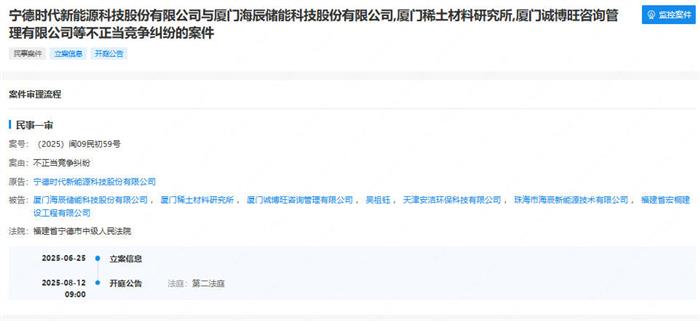Recently, CATL filed a lawsuit against Haicheng Energy and others on the grounds of 'unfair competition.' The Intermediate People's Court of Ningde, Fujian Province, accepted the case on June 25 and is scheduled to hold a hearing on August 12. According to reports, CATL (300750) is suing Xiamen Haicheng Energy Technology Co., Ltd., Wu Zuyu, and Zhuhai Haicheng New Energy Technology Co., Ltd. Notably, as a giant in the battery industry, CATL has repeatedly initiated non-compete agreements to combat employee turnover or entrepreneurial actions. In 2023, Haicheng Energy's founder Wu Zuyu violated a non-compete agreement by poaching talent from CATL, resulting in a compensation payment of 1 million yuan to CATL. It is observed that patent and commercial competition disputes in the battery industry are not uncommon: CATL has been embroiled in a patent litigation tug-of-war with Zhongchuang Innovation for five years without resolution, and has also sued Tafiel for patent infringement and Honeycomb Energy for unfair competition. Essentially, these legal disputes reflect fierce competition among enterprises over technological barriers, market share, and industry voice amidst a heated market environment. On March 25 of this year, Haicheng Energy officially submitted its IPO application to the Hong Kong Stock Exchange, aiming to list on the main board. With a strategic focus on energy storage, Haicheng Energy has rapidly ascended to become one of the top three global companies in lithium-ion energy storage battery shipments within just five years, achieving a compound annual growth rate of 167% in shipments from 2022 to 2024. In terms of capacity, Haicheng Energy's effective annual production capacity for energy storage batteries reached 49.7 GWh in 2024, with a designed annual capacity of 62.0 GWh. The company has established two production bases in China, located in Xiamen, Fujian Province, and Chongqing, and is currently building a third base in Heze, Shandong Province. Additionally, the company has also set up a production base in Texas, USA, becoming the first Chinese company to establish energy storage system production capacity in the United States. The funds raised from this IPO will primarily be used to enhance energy storage battery capacity, research and development, build a global sales and service network, as well as for working capital and other general corporate purposes. In the fiercely competitive new energy battery industry, CATL has demonstrated a significant strategic characteristic in its 'patent wars' against competitors during their IPO phases. Previously, companies like Zhongchuang Innovation and Honeycomb Energy faced patent lawsuits or unfair competition accusations from CATL as they raced towards capital markets. The lawsuit against Haicheng Energy coincides precisely with its key window period for IPO hearings in Hong Kong. The lawsuit from CATL reflects the triple competition of technology, capital, and talent within the new energy sector. As patent wars in power batteries extend into the energy storage arena, the new energy industry appears to be shifting from 'scale expansion' to 'technological monopoly,' and it may become routine for leading companies to use legal means to strengthen their competitive advantages. For emerging forces like Haicheng Energy, proving technological innovation capabilities within a compliant framework, and mitigating short-term risks through capital operations, will be crucial to breaking through the 'predatory' tactics of industry giants.
CATL Sues Haicheng Energy Over Unfair Competition Dispute

Share this post on: